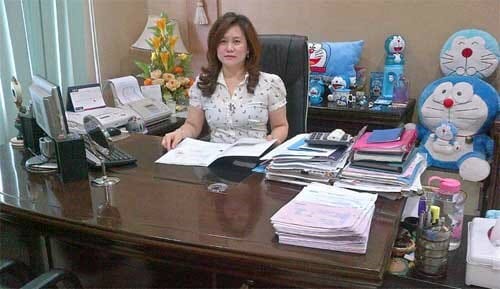
May 25, 2015 | Focolare Worldwide
 Her name is Mardiana. Though short and simple, it is a name which could also pass as a surname also in documents, as often occurs in Indonesia. She is currently national Vice-President of an important multinational assurance company. The Indopost journalist, Heryanto, singled her out recently as one of the most successful women of Jakarta, in one of his interview columns. Her most interesting story centres around a key strength which is a deep spirituality, lived with simplicity and conviction ever since she encountered the Focolare Moviment as a young girl. She achieved her Degree in Economics in 1997 at Medan University (isle of Sumatra), and the following year married Mulianta, also a follower of the spirituality of unity. They wanted to form a family with deep Christian roots, and later had two wonderful children. At a certain point the assurance company Mardiana was working for closed down, but then a new opportunity came up to join Reliance Insurance, another assurance company with branches throughout the world. Often Mardiana had to go to the capital, Jakarta (isle of Java), to attend business meetings. It was a great sacrifice for her, since she wanted so much to stay with her kids. But Mulianta gave her encouragement and support, and helped in taking care of them. Following a promotion, Mulianta was offered a key position in Jakarta, which he refused to be able to remain with his wife and children, and with his outstanding entrepreneurial spirit opened his own business in Medan. Six years passed during which Mardiana’s agency reaped a good turnover resulting also in the well-being of its employees. This was when Mardiana was asked to relocate to Jakarta to assume the position of Vice-President of Reliance Insurance Indonesia. Mulianta and Mardiana reflected on the option to refuse the offer. After all, things were also going ahead in Medan. “But – they said – we must not only think of ourselves. We have to ask ourselves what mission God wants to entrust us with.” And it was precisely Mulianta who pushed Mardiana to accept, despite the fact that he had to leave his business in Medan and find a new job in Jakarta. In the first six months Mardiana continued to go on business trips in order to turn over the work to the new manager and ensure that the Medan market would not suffer any drawbacks due to the change in management. “I am really grateful to God for giving me such an incredible husband!,” Mardiana confided to the Indopost journalist – If he hadn’t encouraged me, I wouldn’t have made it,” and continued, “We have faced everything together– above all the commitment to put evangelical love into practice, which leads us to see each person as a brother to be loved. And so, we do not discriminate anyone, whatever religion they belong to, or position they cover; we are all equal. Whatever is the colour of their skin, ethnic group or religion, they are all brothers for us.” She then recounted a personal experience to the journalist. “Our domestic helper who has been with us for some time now, is Muslim. Besides being honest and hardworking, she is intelligent. So I made a proposal – which she gladly accepted – to send her to university. Many around us said: when she reaches a good position, she will leave and forget you. But love, to our mind, means giving others opportunities and thinking of their future. She will always be part of our family, and we must not think that a household helper has to remain forever as such. The same goes for our driver who has to have a better future.” The journalist, a Muslim, made a very meaningful remark in one of the two articles published on the Indopost: “For Mardiana, being branch manager of Reliance was part of God’s design, even though it is a stressful role with problems of all sorts. But she manages to handle them serenely because her life is founded on love that she learned from the spirituality of the Focolare Movement and of which she and her husband are part. Of course, though she places all her trust in God, it does not mean that she just looks on, but rather, carries out her job with great commitment, as she has always done since she was a working college student.”
Her name is Mardiana. Though short and simple, it is a name which could also pass as a surname also in documents, as often occurs in Indonesia. She is currently national Vice-President of an important multinational assurance company. The Indopost journalist, Heryanto, singled her out recently as one of the most successful women of Jakarta, in one of his interview columns. Her most interesting story centres around a key strength which is a deep spirituality, lived with simplicity and conviction ever since she encountered the Focolare Moviment as a young girl. She achieved her Degree in Economics in 1997 at Medan University (isle of Sumatra), and the following year married Mulianta, also a follower of the spirituality of unity. They wanted to form a family with deep Christian roots, and later had two wonderful children. At a certain point the assurance company Mardiana was working for closed down, but then a new opportunity came up to join Reliance Insurance, another assurance company with branches throughout the world. Often Mardiana had to go to the capital, Jakarta (isle of Java), to attend business meetings. It was a great sacrifice for her, since she wanted so much to stay with her kids. But Mulianta gave her encouragement and support, and helped in taking care of them. Following a promotion, Mulianta was offered a key position in Jakarta, which he refused to be able to remain with his wife and children, and with his outstanding entrepreneurial spirit opened his own business in Medan. Six years passed during which Mardiana’s agency reaped a good turnover resulting also in the well-being of its employees. This was when Mardiana was asked to relocate to Jakarta to assume the position of Vice-President of Reliance Insurance Indonesia. Mulianta and Mardiana reflected on the option to refuse the offer. After all, things were also going ahead in Medan. “But – they said – we must not only think of ourselves. We have to ask ourselves what mission God wants to entrust us with.” And it was precisely Mulianta who pushed Mardiana to accept, despite the fact that he had to leave his business in Medan and find a new job in Jakarta. In the first six months Mardiana continued to go on business trips in order to turn over the work to the new manager and ensure that the Medan market would not suffer any drawbacks due to the change in management. “I am really grateful to God for giving me such an incredible husband!,” Mardiana confided to the Indopost journalist – If he hadn’t encouraged me, I wouldn’t have made it,” and continued, “We have faced everything together– above all the commitment to put evangelical love into practice, which leads us to see each person as a brother to be loved. And so, we do not discriminate anyone, whatever religion they belong to, or position they cover; we are all equal. Whatever is the colour of their skin, ethnic group or religion, they are all brothers for us.” She then recounted a personal experience to the journalist. “Our domestic helper who has been with us for some time now, is Muslim. Besides being honest and hardworking, she is intelligent. So I made a proposal – which she gladly accepted – to send her to university. Many around us said: when she reaches a good position, she will leave and forget you. But love, to our mind, means giving others opportunities and thinking of their future. She will always be part of our family, and we must not think that a household helper has to remain forever as such. The same goes for our driver who has to have a better future.” The journalist, a Muslim, made a very meaningful remark in one of the two articles published on the Indopost: “For Mardiana, being branch manager of Reliance was part of God’s design, even though it is a stressful role with problems of all sorts. But she manages to handle them serenely because her life is founded on love that she learned from the spirituality of the Focolare Movement and of which she and her husband are part. Of course, though she places all her trust in God, it does not mean that she just looks on, but rather, carries out her job with great commitment, as she has always done since she was a working college student.”
May 24, 2015 | Focolare Worldwide
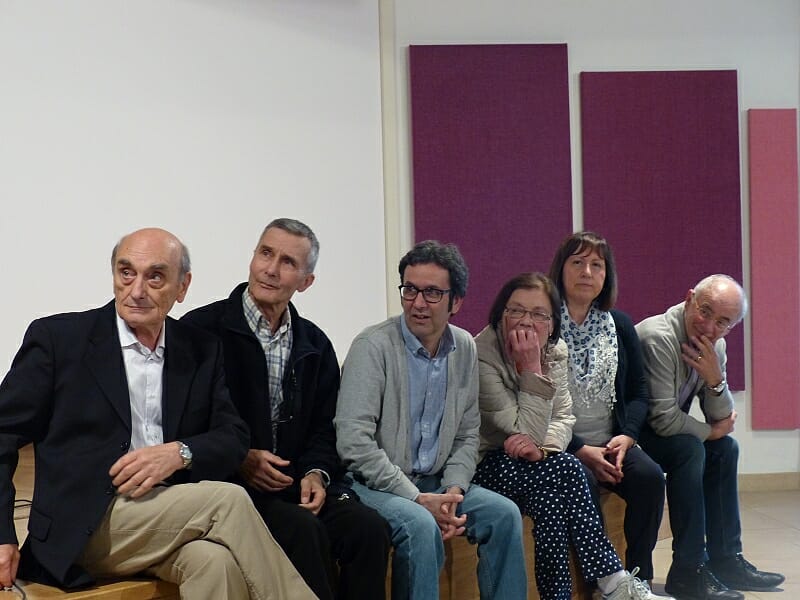
May 23, 2015 | Non categorizzato
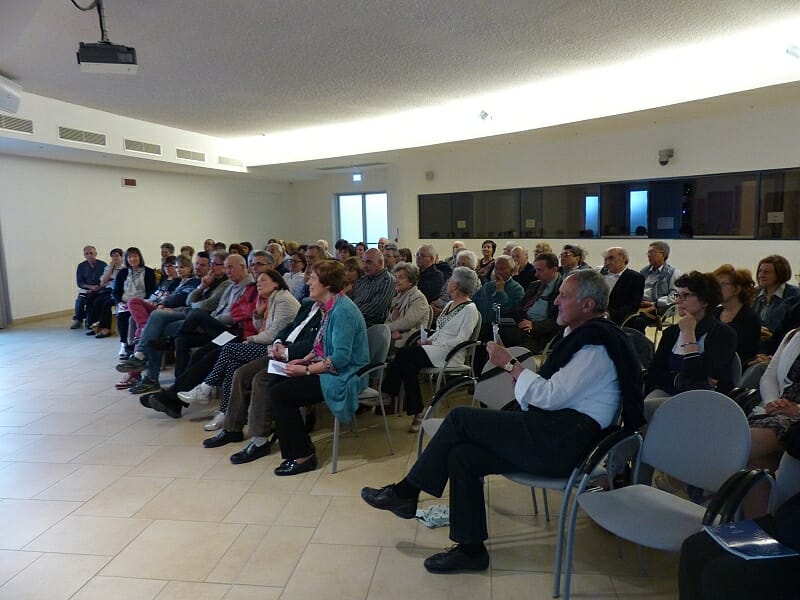 It was the evening of 7 May 1995 at the international Centre in Loppiano (Italy). A group of people of various beliefs and cultural backgrounds were having a lively discussion at dinner. They had spent the entire day together to see whether they, as Catholics and agnostics, could overcome ideological limits, dislikes and century-old prejudices and get to understand, accept and appreciate one another. These gatherings of people who spoke different languages and professed various beliefs had started already in 1978 when Chiara Lubich, founder of the Focolare Movement, set up the “Centre for Dialogue with People who hold No Religious Affiliations” within the scope of a more extensive experience initiated by the Focolare. The 7 May 2015 meeting in Loppiano was taken as an opportunity to take stock of this reality and a challenge to certify, face to face, if mutual esteem is really possible. Over the years, in fact, all have even become “friends,” and getting together and discussing with one another was considered not only stimulating but also very pleasant. At that dinner, however, someone was missing, one who perhaps was the most active in the group: Ugo Radica. This really special focolarino had decided to pursue an idea without notifying anybody and had gone to station himself close to the house of Chiara Lubich, founder of the Movement, who was supposed to arrive in Loppiano that evening. His patience was rewarded in the end when Chiara’s car finally came into view. Ugo approached the car, and Chiara, quite surprised, lowered the window to ask: «What are you doing here, Ugo? He firmly said: “I’m here with a group of friends of different beliefs. Why don’t you come to see us tomorrow? I think it would be very important for them to have an exchange of ideas with you personally.” Chiara accepted though unsure and a bit doubtful. She requested that the group prepare some questions for her to answer. Ugo thus returned to the group full of enthusiasm.
It was the evening of 7 May 1995 at the international Centre in Loppiano (Italy). A group of people of various beliefs and cultural backgrounds were having a lively discussion at dinner. They had spent the entire day together to see whether they, as Catholics and agnostics, could overcome ideological limits, dislikes and century-old prejudices and get to understand, accept and appreciate one another. These gatherings of people who spoke different languages and professed various beliefs had started already in 1978 when Chiara Lubich, founder of the Focolare Movement, set up the “Centre for Dialogue with People who hold No Religious Affiliations” within the scope of a more extensive experience initiated by the Focolare. The 7 May 2015 meeting in Loppiano was taken as an opportunity to take stock of this reality and a challenge to certify, face to face, if mutual esteem is really possible. Over the years, in fact, all have even become “friends,” and getting together and discussing with one another was considered not only stimulating but also very pleasant. At that dinner, however, someone was missing, one who perhaps was the most active in the group: Ugo Radica. This really special focolarino had decided to pursue an idea without notifying anybody and had gone to station himself close to the house of Chiara Lubich, founder of the Movement, who was supposed to arrive in Loppiano that evening. His patience was rewarded in the end when Chiara’s car finally came into view. Ugo approached the car, and Chiara, quite surprised, lowered the window to ask: «What are you doing here, Ugo? He firmly said: “I’m here with a group of friends of different beliefs. Why don’t you come to see us tomorrow? I think it would be very important for them to have an exchange of ideas with you personally.” Chiara accepted though unsure and a bit doubtful. She requested that the group prepare some questions for her to answer. Ugo thus returned to the group full of enthusiasm.
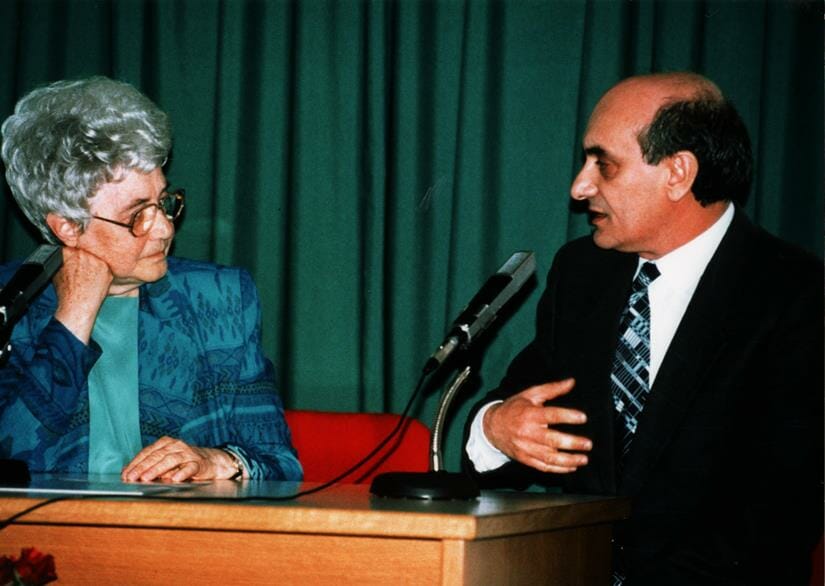
Chiara Lubich meets with the group in Loppiano, 7 May 1995
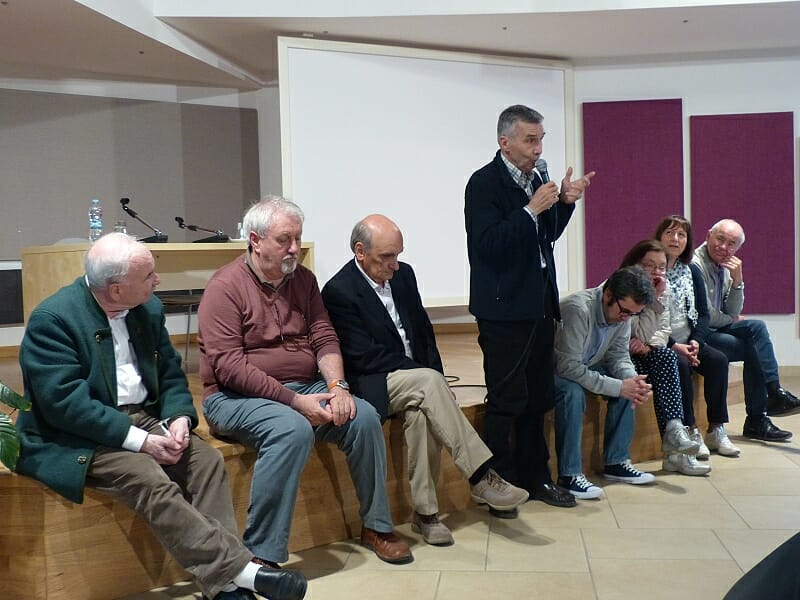 That evening, Tito, one of the friends who had turned up by chance at the last minute, phoned his wife, a genuine Catholic, and a long-time member of the Movement, to proudly announce to her that he had spoken to Chiara personally, while she in all those years still had not seen or had a glimpse of her even from afar.
That evening, Tito, one of the friends who had turned up by chance at the last minute, phoned his wife, a genuine Catholic, and a long-time member of the Movement, to proudly announce to her that he had spoken to Chiara personally, while she in all those years still had not seen or had a glimpse of her even from afar.  Twenty years later, on 7 May 2015 there was again a celebration in Loppiano. A nostalgic commemoration? Absolutely not. Armando, Morena, Tito, Dolores, Piero, Luciana, Roberto, Silvano and many more followed one another onstage to recall those moments, not only to assess the 20 years that have passed, but to also organize the next events. They are convinced, more than ever, of the importance of this type of dialogue. And unlike the moments of encounters between believers, one never knows how these “fourth dialogue” meetings can turn out. But precisely this fact is a warranty of authenticity, since each inevitably has to be fully and personally involved, ready to offer one’s ideas but also accept those of others through an intricate but fruitful exchange. This dialogue which has continued through the years, not without difficulties, has become international, and has reached many countries. Its diffusion and urgency was strongly felt as a pressing responsibility by those who attended the 2015 gathering. This lifestyle has to be actualised firstly among the members of the Movement, to be offered in turn, to all of humanity.
Twenty years later, on 7 May 2015 there was again a celebration in Loppiano. A nostalgic commemoration? Absolutely not. Armando, Morena, Tito, Dolores, Piero, Luciana, Roberto, Silvano and many more followed one another onstage to recall those moments, not only to assess the 20 years that have passed, but to also organize the next events. They are convinced, more than ever, of the importance of this type of dialogue. And unlike the moments of encounters between believers, one never knows how these “fourth dialogue” meetings can turn out. But precisely this fact is a warranty of authenticity, since each inevitably has to be fully and personally involved, ready to offer one’s ideas but also accept those of others through an intricate but fruitful exchange. This dialogue which has continued through the years, not without difficulties, has become international, and has reached many countries. Its diffusion and urgency was strongly felt as a pressing responsibility by those who attended the 2015 gathering. This lifestyle has to be actualised firstly among the members of the Movement, to be offered in turn, to all of humanity.
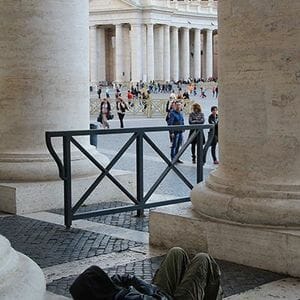
May 22, 2015 | Non categorizzato
 “Our community house is very near St Peter’s Square, in Rome. It was almost nine o’clock in the evening. Our mother superior had just stepped out for a look at the colonnade of Bernini by night with a few compatriots. My cell phone rang, and it was she. “There’s a man here, about 35 years old, who says he was robbed on the metro and lost his ID, money, and cell phone.” I went downstairs to see what could be done. Luciano, as the man called himself, told me he had arrived in Rome that same afternoon, after a twenty-seven hour bus ride. He had managed to scrape together 1,300 euros, thinking it would be enough until he could find work in Italy. I asked him if he wanted to call someone, and he gave me the phone number of his mother in his country of origin. I dialed the number and passed him the cell phone. It was getting late. I called a sister who works at the Charity organization at Termini Train Station to find out if she knew of a place where the man could spend the night, but she told me without ID it wasn’t possible. He decided to sleep outside and to go the next day to the embassy in order to return as soon as possible to his homeland. I asked him if he wanted something to eat or drink, but he was too stressed to eat. He said he still had the sandwiches he had brought for the trip. I offered to accompany him to Pius XIII Square, where many homeless people gather, to entrust him to them (there were others from his country there). Before we reached them, we met B., a homeless woman who sleeps in corners of the apartment buildings. Sometimes we bring her something to eat. I told her about Luciano, without saying, however, that times being as they were, I wasn’t sure if I should believe him. And if it were a scam? But the conviction that he was a neighbour to be loved concretely was stronger. The woman told him, “Go to the dumpster and gather a lot of cardboard, because it’s very cold at night. You can sleep here nearby; no one will harm you.” We left his luggage and went to search for cardboard, which was certainly not easy to find: in that area there are many who sleep on the pavement beneath the walls. In the meantime my superior came to meet us. With the cardboard we returned to B. and left Luciano in her care. Above all, we entrusted him to the Blessed Mother Mary and the Guardian Angels. That night I couldn’t sleep. It was very cold and humid outside. In the morning, I took him at least some warm milk and coffee. He said that because of the cold and discomfort, and the noise of traffic, he hadn’t slept at all. I went back home for Mass. The readings spoke about fasting, which means not only to abstain from food but to “share your food with the hungry and to provide the poor wanderer with shelter, and when you see the naked, to clothe them…” (Is 58: 1-9). I couldn’t go on reading it; I couldn’t answer the priest; I had a lump in my throat and tears running down my cheeks. I, who find it difficult to cry, had understood what the “gift of tears”, which Pope Francis recently spoke of, truly meant. At the end of Mass, I told my superior, “We have to see this through to the end.” Fearing a scam, she was hesitant at first, but then she agreed. Luciano was still there. He had remembered that in the inside pocket of his backpack he had his identity card. We loaded one of his bags in our shopping cart, and the other we helped him to carry. At the bus terminus we discovered that there was a bus leaving for his country that same day. We bought him the ticket. The clerk advised us to wait for the bus to depart because, he pointed out, this type of person often goes to the cash register to return the ticket and be reimbursed. We had to return home, but first we bought him breakfast. There were still two hours until departure, but we continued to trust. I embraced him and left him my cell phone number, a little money for the trip, and a bit of his country’s currency for the train home. That afternoon, someone who had heard about this story gave us a gift in the same amount we had spent. The next day, we received a grateful text message from Luciano. “Thanks for the ticket and everything. I’ve arrived home safe and sound.”
“Our community house is very near St Peter’s Square, in Rome. It was almost nine o’clock in the evening. Our mother superior had just stepped out for a look at the colonnade of Bernini by night with a few compatriots. My cell phone rang, and it was she. “There’s a man here, about 35 years old, who says he was robbed on the metro and lost his ID, money, and cell phone.” I went downstairs to see what could be done. Luciano, as the man called himself, told me he had arrived in Rome that same afternoon, after a twenty-seven hour bus ride. He had managed to scrape together 1,300 euros, thinking it would be enough until he could find work in Italy. I asked him if he wanted to call someone, and he gave me the phone number of his mother in his country of origin. I dialed the number and passed him the cell phone. It was getting late. I called a sister who works at the Charity organization at Termini Train Station to find out if she knew of a place where the man could spend the night, but she told me without ID it wasn’t possible. He decided to sleep outside and to go the next day to the embassy in order to return as soon as possible to his homeland. I asked him if he wanted something to eat or drink, but he was too stressed to eat. He said he still had the sandwiches he had brought for the trip. I offered to accompany him to Pius XIII Square, where many homeless people gather, to entrust him to them (there were others from his country there). Before we reached them, we met B., a homeless woman who sleeps in corners of the apartment buildings. Sometimes we bring her something to eat. I told her about Luciano, without saying, however, that times being as they were, I wasn’t sure if I should believe him. And if it were a scam? But the conviction that he was a neighbour to be loved concretely was stronger. The woman told him, “Go to the dumpster and gather a lot of cardboard, because it’s very cold at night. You can sleep here nearby; no one will harm you.” We left his luggage and went to search for cardboard, which was certainly not easy to find: in that area there are many who sleep on the pavement beneath the walls. In the meantime my superior came to meet us. With the cardboard we returned to B. and left Luciano in her care. Above all, we entrusted him to the Blessed Mother Mary and the Guardian Angels. That night I couldn’t sleep. It was very cold and humid outside. In the morning, I took him at least some warm milk and coffee. He said that because of the cold and discomfort, and the noise of traffic, he hadn’t slept at all. I went back home for Mass. The readings spoke about fasting, which means not only to abstain from food but to “share your food with the hungry and to provide the poor wanderer with shelter, and when you see the naked, to clothe them…” (Is 58: 1-9). I couldn’t go on reading it; I couldn’t answer the priest; I had a lump in my throat and tears running down my cheeks. I, who find it difficult to cry, had understood what the “gift of tears”, which Pope Francis recently spoke of, truly meant. At the end of Mass, I told my superior, “We have to see this through to the end.” Fearing a scam, she was hesitant at first, but then she agreed. Luciano was still there. He had remembered that in the inside pocket of his backpack he had his identity card. We loaded one of his bags in our shopping cart, and the other we helped him to carry. At the bus terminus we discovered that there was a bus leaving for his country that same day. We bought him the ticket. The clerk advised us to wait for the bus to depart because, he pointed out, this type of person often goes to the cash register to return the ticket and be reimbursed. We had to return home, but first we bought him breakfast. There were still two hours until departure, but we continued to trust. I embraced him and left him my cell phone number, a little money for the trip, and a bit of his country’s currency for the train home. That afternoon, someone who had heard about this story gave us a gift in the same amount we had spent. The next day, we received a grateful text message from Luciano. “Thanks for the ticket and everything. I’ve arrived home safe and sound.”
May 21, 2015 | Focolare Worldwide
![Dominican Republic: Dreaming of an Orchestra]()
May 20, 2015 | Focolare Worldwide, Senza categoria
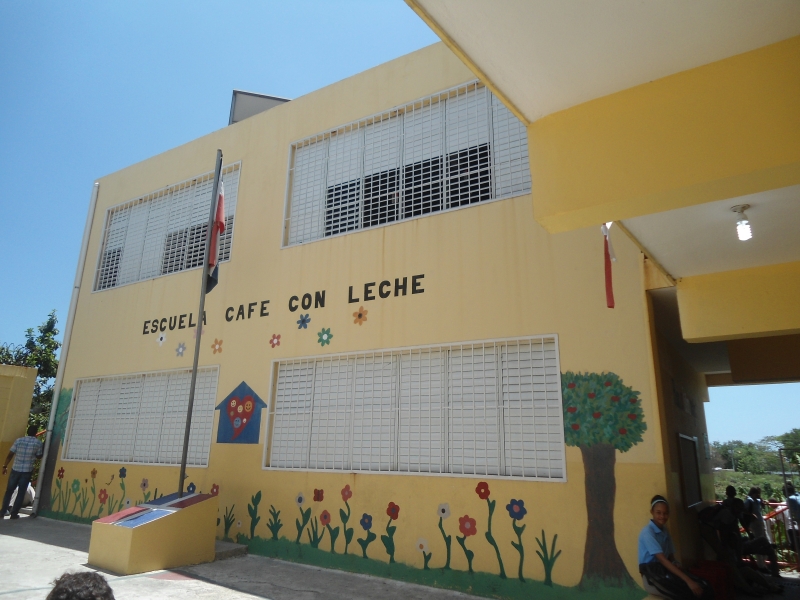 “I could go to the Dominican Republic and teach music for a couple weeks at Cafe’ con Leche School,” I nonchalantly expressed, not ever expecting that my comment would actually be taken seriously. So be it this unexpected trip turned into one of the most fantastic experiences I’ve ever had,” says Diane Gregory,former member of the Gen Verde Performing Arts Band, and who now lives in the United States. Before I knew it, I was on the plane heading for Santo Domingo. It was a chilly morning last April 9th. With snow still on the ground, I left New York’s JFK airport heading towards the Caribbean Island that welcomed me with its warm tropical climate and turquois sea. Along the drive to the colonial zone of the city where I would be staying, I was “taking in” everything, from the beautiful seashore with its coconut trees, to the automobiles, surprised at the number of people they can fit into those vehicles and, most strongly of all, I was being struck by the many impoverished neighborhoods that we passed along the way. The morning after I arrived I was on the Guaguita (a 9-seater van that I’ve seen holding up to 23 people!) with Kathi, a young German girl who is also volunteering at the school. Our stop was the town El Café. We were told of the violence that exists but also that we need not worry for our safety since it was “assumed” that we were there to help in the school. In fact, suffering, violence, unemployment and abandonment, are common amongst many of the families. Café con Leche, one of the many social projects of the Focolare Movement, amazes us with its warmth, liveliness, color and vibrancy. The classrooms are not like the ones I was used to in the US but more creative and just perfect for these 570 students from 1st – 8th grade. And to think that twenty years ago the school had begun in a wooden building with 20 students! Now, with the help of many people there is a school building and a gym that is able to welcome students providing them with a good education and nourishing daily meal – but not only. There is an atmosphere that is difficult to describe, a harmony of relationships that provides the students a very wholesome environment in which to study and grow.
“I could go to the Dominican Republic and teach music for a couple weeks at Cafe’ con Leche School,” I nonchalantly expressed, not ever expecting that my comment would actually be taken seriously. So be it this unexpected trip turned into one of the most fantastic experiences I’ve ever had,” says Diane Gregory,former member of the Gen Verde Performing Arts Band, and who now lives in the United States. Before I knew it, I was on the plane heading for Santo Domingo. It was a chilly morning last April 9th. With snow still on the ground, I left New York’s JFK airport heading towards the Caribbean Island that welcomed me with its warm tropical climate and turquois sea. Along the drive to the colonial zone of the city where I would be staying, I was “taking in” everything, from the beautiful seashore with its coconut trees, to the automobiles, surprised at the number of people they can fit into those vehicles and, most strongly of all, I was being struck by the many impoverished neighborhoods that we passed along the way. The morning after I arrived I was on the Guaguita (a 9-seater van that I’ve seen holding up to 23 people!) with Kathi, a young German girl who is also volunteering at the school. Our stop was the town El Café. We were told of the violence that exists but also that we need not worry for our safety since it was “assumed” that we were there to help in the school. In fact, suffering, violence, unemployment and abandonment, are common amongst many of the families. Café con Leche, one of the many social projects of the Focolare Movement, amazes us with its warmth, liveliness, color and vibrancy. The classrooms are not like the ones I was used to in the US but more creative and just perfect for these 570 students from 1st – 8th grade. And to think that twenty years ago the school had begun in a wooden building with 20 students! Now, with the help of many people there is a school building and a gym that is able to welcome students providing them with a good education and nourishing daily meal – but not only. There is an atmosphere that is difficult to describe, a harmony of relationships that provides the students a very wholesome environment in which to study and grow. 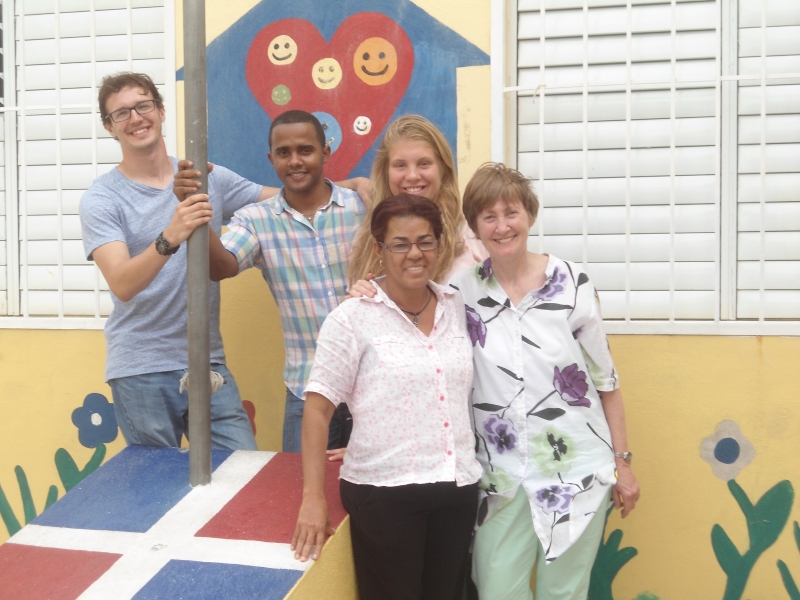 The 10 days that I spent at the school were extremely dynamic. Together with Marisol Jimenez, the founding director, there was a continual flourishing of ideas that we implemented immediately in the classrooms: saxophone and piano lessons; we formed a choir; did musical games and exercises, lessons on reading music; we made our own percussion instruments; put on skits; danced and even had macramé classes. Marisol’s dream is to have a school band. They had already received the instruments from Switzerland and the students are amazing with such a desire to learn (they have a natural rhythm and so much enthusiasm) but, unfortunately, they do not have the funds to hire music teachers on an ongoing basis. We hope that will happen soon! Café con leche is no longer a place that I’ve read about and heard so much about; it has become an “experience”. Now this school, the children, the teachers and everyone here have a name, a face, a story. I left convinced that everything is possible when we “catch the moment” and give it our all.
The 10 days that I spent at the school were extremely dynamic. Together with Marisol Jimenez, the founding director, there was a continual flourishing of ideas that we implemented immediately in the classrooms: saxophone and piano lessons; we formed a choir; did musical games and exercises, lessons on reading music; we made our own percussion instruments; put on skits; danced and even had macramé classes. Marisol’s dream is to have a school band. They had already received the instruments from Switzerland and the students are amazing with such a desire to learn (they have a natural rhythm and so much enthusiasm) but, unfortunately, they do not have the funds to hire music teachers on an ongoing basis. We hope that will happen soon! Café con leche is no longer a place that I’ve read about and heard so much about; it has become an “experience”. Now this school, the children, the teachers and everyone here have a name, a face, a story. I left convinced that everything is possible when we “catch the moment” and give it our all.
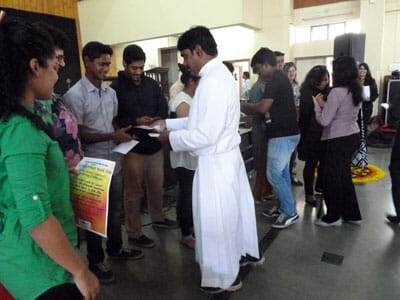
May 19, 2015 | Focolare Worldwide, Senza categoria
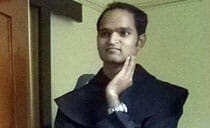 In India, a boom in vocations to consecrated life is seen in various points of the subcontinent: Andra Pradesh, Orissa, and the North Eastern States. “The sense of faith and vision of religious life is well esteemed and the youth feel the urge to enter the novitiate to cultivate their union with the Lord,” Fr Attulli states in an interview with Unità e Carismi (Unity and Charisms) of the Città Nuova editorial group. “They aspire this primarily with experience and prayer – he continued – and they wish to dedicate themselves more to the works of charity. The example of Mother Theresa of Calcutta is strong. From her concrete experience of India, she was able to discover herself and her own vocation, through a profound life of prayer from which her new vocation sprung.” The youth who enter the novitiate come from a part of society that is unable to hide social inequality and poverty, despite the fact that the Indian subcontinent is enumerated among the new world economies. But they have not lost their spiritual dimension, and on the other hand, “Look to God for the solution”. They have found at the same time a solution in social commitment, and in fact “draw inspiration from the works of charity in which they are involved, to solve the poverty in material needs, education, etc. They start with an experience of God, which leads them to undertake apostolic works for the needy.” The Catholic Church has called this the Year of Consecrated life. What should be done to make improvements? “Within the Indian setting, “Fr Attulli explained, “the Church in general and the religious in particular can bear witness to the presence of our Lord Jesus by taking greater care of the poor, in both their spiritual and concrete needs. It is a challenge in this secularized world where we are totally intoxicated with wellbeing! The people want to rediscover God in us, detaching themselves from this addiction to wellbeing.”
In India, a boom in vocations to consecrated life is seen in various points of the subcontinent: Andra Pradesh, Orissa, and the North Eastern States. “The sense of faith and vision of religious life is well esteemed and the youth feel the urge to enter the novitiate to cultivate their union with the Lord,” Fr Attulli states in an interview with Unità e Carismi (Unity and Charisms) of the Città Nuova editorial group. “They aspire this primarily with experience and prayer – he continued – and they wish to dedicate themselves more to the works of charity. The example of Mother Theresa of Calcutta is strong. From her concrete experience of India, she was able to discover herself and her own vocation, through a profound life of prayer from which her new vocation sprung.” The youth who enter the novitiate come from a part of society that is unable to hide social inequality and poverty, despite the fact that the Indian subcontinent is enumerated among the new world economies. But they have not lost their spiritual dimension, and on the other hand, “Look to God for the solution”. They have found at the same time a solution in social commitment, and in fact “draw inspiration from the works of charity in which they are involved, to solve the poverty in material needs, education, etc. They start with an experience of God, which leads them to undertake apostolic works for the needy.” The Catholic Church has called this the Year of Consecrated life. What should be done to make improvements? “Within the Indian setting, “Fr Attulli explained, “the Church in general and the religious in particular can bear witness to the presence of our Lord Jesus by taking greater care of the poor, in both their spiritual and concrete needs. It is a challenge in this secularized world where we are totally intoxicated with wellbeing! The people want to rediscover God in us, detaching themselves from this addiction to wellbeing.”  “Why do people stray from God? Why do they not feel the need to go towards Him? the religious asked himself. And the answer came from his own life experience. “If we stand by the poor and those in need, we discover God’s presence in them. The missionaries who live with the poor, come in contact with people who have faith, even if they need to be helped to grow in the “’culture of faith’, through catechism, prayers and the sacraments.” “In the Indian continent,” he concluded, “not only is there material poverty, but there are also existential peripheries. We are made for love and called to live a serene, peaceful and joyful life in love. Faith does not weigh on our minds, but is there to make us live with joy, not only in the life to come, but here and now. This is why our presence in the existential peripheries and with the poor is of great importance.”
“Why do people stray from God? Why do they not feel the need to go towards Him? the religious asked himself. And the answer came from his own life experience. “If we stand by the poor and those in need, we discover God’s presence in them. The missionaries who live with the poor, come in contact with people who have faith, even if they need to be helped to grow in the “’culture of faith’, through catechism, prayers and the sacraments.” “In the Indian continent,” he concluded, “not only is there material poverty, but there are also existential peripheries. We are made for love and called to live a serene, peaceful and joyful life in love. Faith does not weigh on our minds, but is there to make us live with joy, not only in the life to come, but here and now. This is why our presence in the existential peripheries and with the poor is of great importance.”

May 18, 2015 | Focolare Worldwide
 At the opening session, Bishop Nunzio Galantino, Secretary General of the Italian Episcopal Conference (IEC), declared that «The spirit of the Episcopal Conference is to start from those involved,» underlining how this is also proven by the meeting which saw the participation of all the ecclesial organisations operating in the social fields. «The ecclesial congress of November will start in Prato, the ideal periphery of Florence and home to Chinese immigrants, and where the Pope is scheduled to make his pastoral visit.» In an interview, Prof. Coda summarised the objective of the two-day work session. «We want to reflect and offer our testimonial through the experiences of some dynamic groups of the Church in Italy, that are working in the frontlines of service to the poor and homeless and in creating an open dialogue in all spheres.» The preparatory meeting delved into the theme on “The Servant of the Lord and the humanity of mankind” (15-16 May), organized by the Abele Group and their magazine, “Il Regno,” with the cooperation of the Italian Catholic Action, Carits, CNCA and the Networks of Charity and the Focolare Movement. “Together with the others, Piero Coda continued, these experiences «open out to all the existential frontiers of society, as Pope Francis says.» Furthermore, «in Evangelii Gaudium, Pope Francis uses a beautiful expression: we must say “yes” to all the new relationships generated by Jesus. All the groups involved in this event actualise in various ways, this “yes to new relationships” with the cultural and social divides, marginalisation of all sorts, the world around us, and the home common to all Creation, precisely as an expression of this reality of relationships.» Maria Voce’s presence underlined the Focolare’s adhesion to this preparatory path which aims above all to highlight the life of those who give all their energy every day to creating this “new humanism.” «The Church breaks through the confines of the building of religious rites, and in full communion between the clergy and laity, comes closer to present day humanity,» she affirmed in her speech. This Convention «targets the start of a new season in the life and mission of the Church in Italy: not only with regard to the pressing need for “pastoral conversion” but also for the role and public conduct of Christians in facing the social, economic and political realities of our country and keeping an open attitude toward Europe and the world.» She then referred to the challenges of pluralism and the need to harmonise the multitude of diversities in the public field. «This new season stands for the transformation of the world, starting from the radical conversion of our hearts and minds in order to be ready to meet Jesus in each person. God cannot receive us alone, he wants us to go to him with our brethren… To give the Christian name of fraternity to social relationships means committing ourselves to harmonizing the weft of relationships, recognising our mutual belonging and the bonds of responsibility implied, and orienting personal and collective efforts towards the common good.» This is why «we must give a voice and dignity to those at the periphery, extend the spheres of inclusion, and heal and rebuild the frayed social fabric. It is primarily the youth who wish to give their own contribution. So many initiatives have started up locally, in the heart of numberless fragments of “fraternal” civil life!» As a confirmation of Maria Voce’s words, were the almost 200 members of the Focolare Movement attending the meeting, and involved in many ways in the ecclesial organisations, and active in various fields: interreligious dialogue, reception of immigrants, politics, culture and legality, schooling, and the real opening of worksites for the good of Italy. It is a participation which demonstrates their concrete commitment, together with many other active groups.
At the opening session, Bishop Nunzio Galantino, Secretary General of the Italian Episcopal Conference (IEC), declared that «The spirit of the Episcopal Conference is to start from those involved,» underlining how this is also proven by the meeting which saw the participation of all the ecclesial organisations operating in the social fields. «The ecclesial congress of November will start in Prato, the ideal periphery of Florence and home to Chinese immigrants, and where the Pope is scheduled to make his pastoral visit.» In an interview, Prof. Coda summarised the objective of the two-day work session. «We want to reflect and offer our testimonial through the experiences of some dynamic groups of the Church in Italy, that are working in the frontlines of service to the poor and homeless and in creating an open dialogue in all spheres.» The preparatory meeting delved into the theme on “The Servant of the Lord and the humanity of mankind” (15-16 May), organized by the Abele Group and their magazine, “Il Regno,” with the cooperation of the Italian Catholic Action, Carits, CNCA and the Networks of Charity and the Focolare Movement. “Together with the others, Piero Coda continued, these experiences «open out to all the existential frontiers of society, as Pope Francis says.» Furthermore, «in Evangelii Gaudium, Pope Francis uses a beautiful expression: we must say “yes” to all the new relationships generated by Jesus. All the groups involved in this event actualise in various ways, this “yes to new relationships” with the cultural and social divides, marginalisation of all sorts, the world around us, and the home common to all Creation, precisely as an expression of this reality of relationships.» Maria Voce’s presence underlined the Focolare’s adhesion to this preparatory path which aims above all to highlight the life of those who give all their energy every day to creating this “new humanism.” «The Church breaks through the confines of the building of religious rites, and in full communion between the clergy and laity, comes closer to present day humanity,» she affirmed in her speech. This Convention «targets the start of a new season in the life and mission of the Church in Italy: not only with regard to the pressing need for “pastoral conversion” but also for the role and public conduct of Christians in facing the social, economic and political realities of our country and keeping an open attitude toward Europe and the world.» She then referred to the challenges of pluralism and the need to harmonise the multitude of diversities in the public field. «This new season stands for the transformation of the world, starting from the radical conversion of our hearts and minds in order to be ready to meet Jesus in each person. God cannot receive us alone, he wants us to go to him with our brethren… To give the Christian name of fraternity to social relationships means committing ourselves to harmonizing the weft of relationships, recognising our mutual belonging and the bonds of responsibility implied, and orienting personal and collective efforts towards the common good.» This is why «we must give a voice and dignity to those at the periphery, extend the spheres of inclusion, and heal and rebuild the frayed social fabric. It is primarily the youth who wish to give their own contribution. So many initiatives have started up locally, in the heart of numberless fragments of “fraternal” civil life!» As a confirmation of Maria Voce’s words, were the almost 200 members of the Focolare Movement attending the meeting, and involved in many ways in the ecclesial organisations, and active in various fields: interreligious dialogue, reception of immigrants, politics, culture and legality, schooling, and the real opening of worksites for the good of Italy. It is a participation which demonstrates their concrete commitment, together with many other active groups.

May 16, 2015 | Non categorizzato
Audio mp3 in Italian “But God loved us with so much love that he was generous with his mercy: when we were dead through our sins, he brought us to life with Christ” (Eph. 2:4-5).  “The commentary on this Word of Life, underlines two characteristics of God’s love. One is that God in His love took the initiative to love us even though we were anything but lovable (“dead through our sins”). The second is that God’s love did not only reach the point of forgiving our sins, but since His love is infinite, He brought us to share in His own life (“he brought us to life in Christ”). These words and thoughts take us back to the very beginnings of the Focolare, when God enkindled in our hearts the spark of our great ideal. In the light of this splendid Word of Life, I realize that the spark or the fire was nothing less than our sharing in Love itself, who is God. In the midst of the dreariness and desolation which surrounded us due to the war, did we find others taking the initiative to love us? Through a special gift of God, wasn’t it in fact we who were the ones lighting the flame of love in many hearts around us, urged on by the desire to see this flame ablaze in everyone? Did we choose to love those who appeared the most likeable or rather were we more attracted to the poorest of all in whom we could better recognize the countenance of Christ, and to sinners who most needed His mercy? Yes, by a divine miracle, (the kind of miracle that occurs each time a charism of the Holy Spirit pours forth in the world), our own little hearts could witness to being rich in mercy. As we know, loving our neighbours did not simply mean to make ourselves one with them to the point of bringing them to God. It meant to draw them into our revolution of love, our very ideal. We considered everyone to be a candidate for unity and so everyone could and did participate in the dynamic divine life that God had brought about at a given point in the Church’s history. That is how it was then, and so it should be today. Certainly times have changed, but it shouldn’t be difficult to admit that if the world at that time seemed like a desert because of the destruction of the war, the world today, even though the reasons may be different, shouldn’t seem to be any less of a desert. Many factors have contributed toward the levelling out of our modern society; we live in very ambiguous times. In the past society was fundamentally Christian and a clear distinction could be made between good and evil. That is not the case today. In the name of a freedom which is not true freedom, good and evil, observance and non-observance of the commandments are all put on the same level. We are living in a new kind of desert, where what has been bombed are not homes, churches, and other buildings, but moral laws, and as a result, individual consciences too. What can be done about this? Are we without weapons in our battle to bring the forgiveness and love of Christ to a world which takes so little account of the reality of sin? No, we are not without weapons. This desecrated world has a countenance for us: Jesus Forsaken, in whom the sacred and the divine are completely hidden. In every negative situation we can see a reflection of Him, God who is abandoned by God. It is in His name and in our love for Him that we will find the strength to love what today appears so despicable. With the fire of love aflame in our hearts, and like our God who always takes the initiative, we will reach out to those we meet along our way. God in us will reawaken and enlighten consciences, instil contrition, bring back hope, enflame with enthusiasm, giving a desire to many, dead as they are, to be brought to life in Christ. So, places three objectives before us: to keep the fire burning in our hearts; to be the first to love; and not to limit our love, but to love boundlessly. In this way we will bring many people to live our ideal, which is to live Christ. Only by living on this level can we be in line with what the Scriptures ask of us this month”. (…) (Chiara Lubich, Rocca di Papa, on January 3, 1985) Source: Chiara Lubich Center
“The commentary on this Word of Life, underlines two characteristics of God’s love. One is that God in His love took the initiative to love us even though we were anything but lovable (“dead through our sins”). The second is that God’s love did not only reach the point of forgiving our sins, but since His love is infinite, He brought us to share in His own life (“he brought us to life in Christ”). These words and thoughts take us back to the very beginnings of the Focolare, when God enkindled in our hearts the spark of our great ideal. In the light of this splendid Word of Life, I realize that the spark or the fire was nothing less than our sharing in Love itself, who is God. In the midst of the dreariness and desolation which surrounded us due to the war, did we find others taking the initiative to love us? Through a special gift of God, wasn’t it in fact we who were the ones lighting the flame of love in many hearts around us, urged on by the desire to see this flame ablaze in everyone? Did we choose to love those who appeared the most likeable or rather were we more attracted to the poorest of all in whom we could better recognize the countenance of Christ, and to sinners who most needed His mercy? Yes, by a divine miracle, (the kind of miracle that occurs each time a charism of the Holy Spirit pours forth in the world), our own little hearts could witness to being rich in mercy. As we know, loving our neighbours did not simply mean to make ourselves one with them to the point of bringing them to God. It meant to draw them into our revolution of love, our very ideal. We considered everyone to be a candidate for unity and so everyone could and did participate in the dynamic divine life that God had brought about at a given point in the Church’s history. That is how it was then, and so it should be today. Certainly times have changed, but it shouldn’t be difficult to admit that if the world at that time seemed like a desert because of the destruction of the war, the world today, even though the reasons may be different, shouldn’t seem to be any less of a desert. Many factors have contributed toward the levelling out of our modern society; we live in very ambiguous times. In the past society was fundamentally Christian and a clear distinction could be made between good and evil. That is not the case today. In the name of a freedom which is not true freedom, good and evil, observance and non-observance of the commandments are all put on the same level. We are living in a new kind of desert, where what has been bombed are not homes, churches, and other buildings, but moral laws, and as a result, individual consciences too. What can be done about this? Are we without weapons in our battle to bring the forgiveness and love of Christ to a world which takes so little account of the reality of sin? No, we are not without weapons. This desecrated world has a countenance for us: Jesus Forsaken, in whom the sacred and the divine are completely hidden. In every negative situation we can see a reflection of Him, God who is abandoned by God. It is in His name and in our love for Him that we will find the strength to love what today appears so despicable. With the fire of love aflame in our hearts, and like our God who always takes the initiative, we will reach out to those we meet along our way. God in us will reawaken and enlighten consciences, instil contrition, bring back hope, enflame with enthusiasm, giving a desire to many, dead as they are, to be brought to life in Christ. So, places three objectives before us: to keep the fire burning in our hearts; to be the first to love; and not to limit our love, but to love boundlessly. In this way we will bring many people to live our ideal, which is to live Christ. Only by living on this level can we be in line with what the Scriptures ask of us this month”. (…) (Chiara Lubich, Rocca di Papa, on January 3, 1985) Source: Chiara Lubich Center
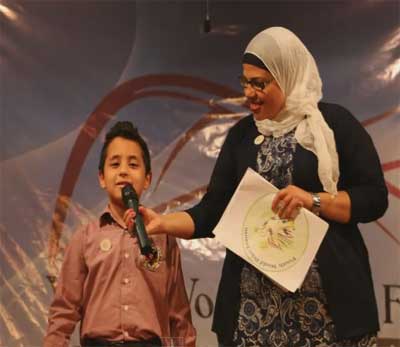
May 15, 2015 | Focolare Worldwide, Senza categoria
 “The Peace Forum was a unique experience. I enjoyed every moment of the programme. Such a meeting (. . .) makes one hope that better days are coming and that one day poverty, hunger discrimination and violence will see their end.” This is how Rasha, an English teacher at Rowad American College, describes Living Peace 2015 which was held in Cairo on May 4-6, 2015, following a three-day congress in Alexandria, Egypt that provided the young people with the necessary background knowledge. In Alexandria there were moments of sharing and mutual understanding, sharing the joys and sorrows that they brought with them from their own countries. In Cairo, there was a beautiful welcome, with festivities along the Nile on a large boat, with games, dancing and song. Then came the actual World Forum of Students for Peace. The project was promoted by New Humanity, an NGO, through the Cayrus project approved by the European Union. Various partners and sponsors from different countries adhered to the project and sent youth representatives to Egypt. For three days 1300 students and professors from more than 20 schools and 8 Egyptian universities shared testimonies of their common commitment to peace: best practices, more than 50 educational projects for peace, workshops, seminars, exhibits and artistic performances. Also present were ambassadors and diplomatic representatives from Argentina, Brazil, Uruguay, Guatemala, Cuba, Democratic Republic of Congo, Cameroon, Pakistan, Portugal, Croatia, Mexico, Germany and Sudan. Begun in 2011 by an English teacher at El Rowad American College of Cairo, as an educational project for peace, today, Living Peace involves more than 2500 students from around the world. A main feature of the project is the way it directly engages the students and teachers in the creation of an educational peace initiative, involving a global network of people and institutions. Membership in the project enables each school to develop projects in accordance with their own possibilities, favouring the creativity of the students along with the awareness that they are contributing towards a common goal. This creates a dynamic of participation that motivates the different components of the school, reinforcing solidarity amongst students, teachers, directors and families, with repercussions in civil society. The 2015 Forum was the occasion for presenting Scholas Occurrentes, the large global network that the Pope wished to see when he was still archbishop of Buenos Aires, and that now connects more than 400,0000 schools around the world. The presence of Dominicus Rohde from Germany, President of the World Peace Forum, raised the tone of the events. Since it was the first world forum held by young people, it opened the doors to a new road. The worldwide forum on peace has awarded the Luxemburg Peace Prize to New Humanity. The prestigious Nelson Mandela Medal was consigned to Cecilia Landucci who represented the NGO in Cairo. See video: Living Peace 2015 https://www.youtube.com/watch?v=nugDbxgoccg&feature=youtu.be Source: ONG New Humanity, AMU e Umanità Nuova. Updated May 27, 2015
“The Peace Forum was a unique experience. I enjoyed every moment of the programme. Such a meeting (. . .) makes one hope that better days are coming and that one day poverty, hunger discrimination and violence will see their end.” This is how Rasha, an English teacher at Rowad American College, describes Living Peace 2015 which was held in Cairo on May 4-6, 2015, following a three-day congress in Alexandria, Egypt that provided the young people with the necessary background knowledge. In Alexandria there were moments of sharing and mutual understanding, sharing the joys and sorrows that they brought with them from their own countries. In Cairo, there was a beautiful welcome, with festivities along the Nile on a large boat, with games, dancing and song. Then came the actual World Forum of Students for Peace. The project was promoted by New Humanity, an NGO, through the Cayrus project approved by the European Union. Various partners and sponsors from different countries adhered to the project and sent youth representatives to Egypt. For three days 1300 students and professors from more than 20 schools and 8 Egyptian universities shared testimonies of their common commitment to peace: best practices, more than 50 educational projects for peace, workshops, seminars, exhibits and artistic performances. Also present were ambassadors and diplomatic representatives from Argentina, Brazil, Uruguay, Guatemala, Cuba, Democratic Republic of Congo, Cameroon, Pakistan, Portugal, Croatia, Mexico, Germany and Sudan. Begun in 2011 by an English teacher at El Rowad American College of Cairo, as an educational project for peace, today, Living Peace involves more than 2500 students from around the world. A main feature of the project is the way it directly engages the students and teachers in the creation of an educational peace initiative, involving a global network of people and institutions. Membership in the project enables each school to develop projects in accordance with their own possibilities, favouring the creativity of the students along with the awareness that they are contributing towards a common goal. This creates a dynamic of participation that motivates the different components of the school, reinforcing solidarity amongst students, teachers, directors and families, with repercussions in civil society. The 2015 Forum was the occasion for presenting Scholas Occurrentes, the large global network that the Pope wished to see when he was still archbishop of Buenos Aires, and that now connects more than 400,0000 schools around the world. The presence of Dominicus Rohde from Germany, President of the World Peace Forum, raised the tone of the events. Since it was the first world forum held by young people, it opened the doors to a new road. The worldwide forum on peace has awarded the Luxemburg Peace Prize to New Humanity. The prestigious Nelson Mandela Medal was consigned to Cecilia Landucci who represented the NGO in Cairo. See video: Living Peace 2015 https://www.youtube.com/watch?v=nugDbxgoccg&feature=youtu.be Source: ONG New Humanity, AMU e Umanità Nuova. Updated May 27, 2015

 Her name is Mardiana. Though short and simple, it is a name which could also pass as a surname also in documents, as often occurs in Indonesia. She is currently national Vice-President of an important multinational assurance company. The Indopost journalist, Heryanto, singled her out recently as one of the most successful women of Jakarta, in one of his interview columns. Her most interesting story centres around a key strength which is a deep spirituality, lived with simplicity and conviction ever since she encountered the Focolare Moviment as a young girl. She achieved her Degree in Economics in 1997 at Medan University (isle of Sumatra), and the following year married Mulianta, also a follower of the spirituality of unity. They wanted to form a family with deep Christian roots, and later had two wonderful children. At a certain point the assurance company Mardiana was working for closed down, but then a new opportunity came up to join Reliance Insurance, another assurance company with branches throughout the world. Often Mardiana had to go to the capital, Jakarta (isle of Java), to attend business meetings. It was a great sacrifice for her, since she wanted so much to stay with her kids. But Mulianta gave her encouragement and support, and helped in taking care of them. Following a promotion, Mulianta was offered a key position in Jakarta, which he refused to be able to remain with his wife and children, and with his outstanding entrepreneurial spirit opened his own business in Medan. Six years passed during which Mardiana’s agency reaped a good turnover resulting also in the well-being of its employees. This was when Mardiana was asked to relocate to Jakarta to assume the position of Vice-President of Reliance Insurance Indonesia. Mulianta and Mardiana reflected on the option to refuse the offer. After all, things were also going ahead in Medan. “But – they said – we must not only think of ourselves. We have to ask ourselves what mission God wants to entrust us with.” And it was precisely Mulianta who pushed Mardiana to accept, despite the fact that he had to leave his business in Medan and find a new job in Jakarta. In the first six months Mardiana continued to go on business trips in order to turn over the work to the new manager and ensure that the Medan market would not suffer any drawbacks due to the change in management. “I am really grateful to God for giving me such an incredible husband!,” Mardiana confided to the Indopost journalist – If he hadn’t encouraged me, I wouldn’t have made it,” and continued, “We have faced everything together– above all the commitment to put evangelical love into practice, which leads us to see each person as a brother to be loved. And so, we do not discriminate anyone, whatever religion they belong to, or position they cover; we are all equal. Whatever is the colour of their skin, ethnic group or religion, they are all brothers for us.” She then recounted a personal experience to the journalist. “Our domestic helper who has been with us for some time now, is Muslim. Besides being honest and hardworking, she is intelligent. So I made a proposal – which she gladly accepted – to send her to university. Many around us said: when she reaches a good position, she will leave and forget you. But love, to our mind, means giving others opportunities and thinking of their future. She will always be part of our family, and we must not think that a household helper has to remain forever as such. The same goes for our driver who has to have a better future.” The journalist, a Muslim, made a very meaningful remark in one of the two articles published on the Indopost: “For Mardiana, being branch manager of Reliance was part of God’s design, even though it is a stressful role with problems of all sorts. But she manages to handle them serenely because her life is founded on love that she learned from the spirituality of the Focolare Movement and of which she and her husband are part. Of course, though she places all her trust in God, it does not mean that she just looks on, but rather, carries out her job with great commitment, as she has always done since she was a working college student.”
Her name is Mardiana. Though short and simple, it is a name which could also pass as a surname also in documents, as often occurs in Indonesia. She is currently national Vice-President of an important multinational assurance company. The Indopost journalist, Heryanto, singled her out recently as one of the most successful women of Jakarta, in one of his interview columns. Her most interesting story centres around a key strength which is a deep spirituality, lived with simplicity and conviction ever since she encountered the Focolare Moviment as a young girl. She achieved her Degree in Economics in 1997 at Medan University (isle of Sumatra), and the following year married Mulianta, also a follower of the spirituality of unity. They wanted to form a family with deep Christian roots, and later had two wonderful children. At a certain point the assurance company Mardiana was working for closed down, but then a new opportunity came up to join Reliance Insurance, another assurance company with branches throughout the world. Often Mardiana had to go to the capital, Jakarta (isle of Java), to attend business meetings. It was a great sacrifice for her, since she wanted so much to stay with her kids. But Mulianta gave her encouragement and support, and helped in taking care of them. Following a promotion, Mulianta was offered a key position in Jakarta, which he refused to be able to remain with his wife and children, and with his outstanding entrepreneurial spirit opened his own business in Medan. Six years passed during which Mardiana’s agency reaped a good turnover resulting also in the well-being of its employees. This was when Mardiana was asked to relocate to Jakarta to assume the position of Vice-President of Reliance Insurance Indonesia. Mulianta and Mardiana reflected on the option to refuse the offer. After all, things were also going ahead in Medan. “But – they said – we must not only think of ourselves. We have to ask ourselves what mission God wants to entrust us with.” And it was precisely Mulianta who pushed Mardiana to accept, despite the fact that he had to leave his business in Medan and find a new job in Jakarta. In the first six months Mardiana continued to go on business trips in order to turn over the work to the new manager and ensure that the Medan market would not suffer any drawbacks due to the change in management. “I am really grateful to God for giving me such an incredible husband!,” Mardiana confided to the Indopost journalist – If he hadn’t encouraged me, I wouldn’t have made it,” and continued, “We have faced everything together– above all the commitment to put evangelical love into practice, which leads us to see each person as a brother to be loved. And so, we do not discriminate anyone, whatever religion they belong to, or position they cover; we are all equal. Whatever is the colour of their skin, ethnic group or religion, they are all brothers for us.” She then recounted a personal experience to the journalist. “Our domestic helper who has been with us for some time now, is Muslim. Besides being honest and hardworking, she is intelligent. So I made a proposal – which she gladly accepted – to send her to university. Many around us said: when she reaches a good position, she will leave and forget you. But love, to our mind, means giving others opportunities and thinking of their future. She will always be part of our family, and we must not think that a household helper has to remain forever as such. The same goes for our driver who has to have a better future.” The journalist, a Muslim, made a very meaningful remark in one of the two articles published on the Indopost: “For Mardiana, being branch manager of Reliance was part of God’s design, even though it is a stressful role with problems of all sorts. But she manages to handle them serenely because her life is founded on love that she learned from the spirituality of the Focolare Movement and of which she and her husband are part. Of course, though she places all her trust in God, it does not mean that she just looks on, but rather, carries out her job with great commitment, as she has always done since she was a working college student.”









